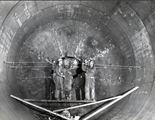


[New Scientist] Artificial photosynthesis has yet to be cracked, but electrical engineers in the U.S. think that synthetic leaves could be used to generate electricity in a different way — by sweating. Michel Maharbiz, with Berkeley Lab’s Physical Biosciences Division, working with colleagues at the University of Michigan and MIT, built their leaves from glass wafers shot through with a branching network of tiny water-filled channels arranged like the veins of a leaf. More>
 [Wall St. Journal] Recently, a group of scientists and state officials descended in a cage-like elevator nearly a mile through solid rock to rechristen the Homestake gold mine the Sanford Underground Laboratory at Homestake. The event celebrated the first steps toward transforming the 8,000-foot-deep mine into a place for scientists to hunt for fundamental particles difficult to find on the earth's surface. Near term, scientists are preparing to place a chamber of liquefied xenon in the mine, looking for flashes of light that would indicate a collision with dark matter. "These are fundamental questions" the lab could explore for decades, Berkeley Lab physicist Kevin Lesko said. More>
[Wall St. Journal] Recently, a group of scientists and state officials descended in a cage-like elevator nearly a mile through solid rock to rechristen the Homestake gold mine the Sanford Underground Laboratory at Homestake. The event celebrated the first steps toward transforming the 8,000-foot-deep mine into a place for scientists to hunt for fundamental particles difficult to find on the earth's surface. Near term, scientists are preparing to place a chamber of liquefied xenon in the mine, looking for flashes of light that would indicate a collision with dark matter. "These are fundamental questions" the lab could explore for decades, Berkeley Lab physicist Kevin Lesko said. More>
 [Physics Today] In science, metaphor plays an important role in transferring ideas among disciplines, but metaphors can often mask inner truths, writes T.N. Narasimhan of the Earth Sciences Division in the July issue of Physics Today. The history of the scientific and mathematical study of diffusion, says Narasimhan, shows how studies of the physical propagation of heat by Joseph Fourier, early in the 19th century, were adapted by Simon LaPlace in his work on probability. Einstein brilliantly combined the two ideas in his theory of atoms and molecules, and to this day, scientists and mathematicians stress the similarities of the approaches and ignore their inherent differences, at their peril. More>
[Physics Today] In science, metaphor plays an important role in transferring ideas among disciplines, but metaphors can often mask inner truths, writes T.N. Narasimhan of the Earth Sciences Division in the July issue of Physics Today. The history of the scientific and mathematical study of diffusion, says Narasimhan, shows how studies of the physical propagation of heat by Joseph Fourier, early in the 19th century, were adapted by Simon LaPlace in his work on probability. Einstein brilliantly combined the two ideas in his theory of atoms and molecules, and to this day, scientists and mathematicians stress the similarities of the approaches and ignore their inherent differences, at their peril. More>
Associate Lab Director and Life Sciences Division Director Joe Gray has accepted his reappointment to the National Cancer Institute (NCI) Board of Scientific Advisors for another four years. Gray has served the board since 2004. It consists of 35 members from the fields of laboratory, clinical and biometric research, clinical cancer treatment, cancer etiology, and cancer prevention and control. The board provides scientific advice to NCI leadership on a variety of matters concerning scientific program policy, progress, and future direction of NCI's extramural research programs.
The numerous construction projects taking place at the Lab mean a lot of truck traffic on the Hill. Any trucks 40 feet long or more traveling through the Lab require a pilot-car escort, a service being provided by Loadstar. These cars are identified by flags on the roofs. To improve safety during these trips, drivers should let the truck and pilot cars proceed along their route. Do not try to pass them or pull in between pilot cars and the truck. Loadstar personnel are assisting pedestrians at the Building 65 crosswalk in the morning and, during lunch, the cafeteria/Guest House crosswalk. To schedule a truck escort, contact the Work Request Center. For more information contact Tammy Brown (x5232).
 Health: August is National Immunization Awareness Month
Health: August is National Immunization Awareness MonthThe Lab’s Health Care Facilitator wants to remind employees that August is "National Immunization Awareness Month." Immunizations are noted as one of the most significant health interventions of the 20th century. They have helped eradicate some diseases and reduce others. Immunizations are not just for school children, some are recommended for teens and adults, and a few require boosters throughout life. Staying up to date on the recommended vaccines is an important measure to protect yourself and others from life-threatening diseases. More>
Today at Berkeley Lab is produced by Public Affairs' Communications Department